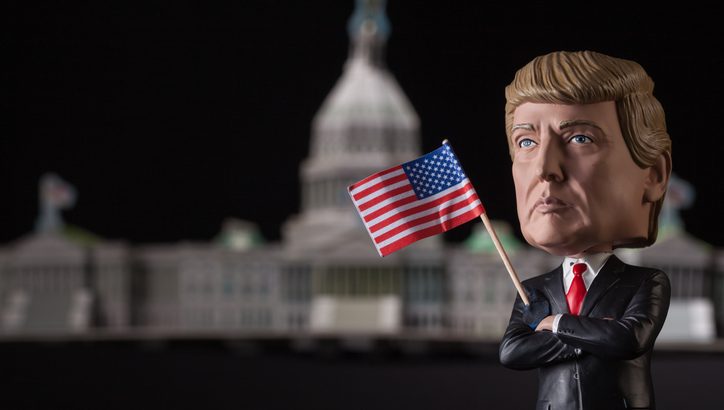Use of the law as a weapon of war may find favor with the Trump administration, according to some scholars and attorneys. “I don’t know what plans the Trump administration may have to incorporate lawfare into its foreign policy strategy, but if we have an opportunity to use law instead of more traditional weapons to address foreign policy issues, I’m all for it,” says law professor Charles Dunlap, executive director of Duke’s Center on Law, Ethics and National Security.
Read More in VOA
NC Lawmakers, Governor Ready for Showdown
“I’m not optimistic, at least at first,” says Pope “Mac” McCorkle, a professor at the Sanford School of Public Policy. “It seems like a very poisonous atmosphere. … Neither side can withstand for too long a growing perception that Raleigh’s just one big mess.”
Read More in The New York Times
Behind Trump Pipeline Orders, a Pledge to Deliver Energy Jobs
President Trump has issued executive orders backing pipelines, and wants to open federal lands and loosen regulations. All that may add jobs in the industry, but market forces are in driver’s seat. Opening up federal lands “won’t necessarily lead to more wells if natural gas prices are low,” says Lincoln Pratson, a professor of earth and ocean sciences. For oil, Pratson says that demand from car drivers and truckers looks more stable than poised for big increases.
Read More in the Christian Science Monitor
The View from the Republican Sideline
“For now, we observe that the dominant lesson of the last 100 years has been just this: When America led in the effort to rally friends and partners from around the world to confront global challenges, it went better for American interests in the long run. And when America retreated in the pursuit of short-term and parochial calculations of national interest, it went much worse for our nation in the long run,” writes political scientist Peter Feaver and a colleague.
Read More in Foreign Policy
A Novel Way to Help Readers Spot Fake News
Jack Zhou, an instructor in environmental politics, says some occupants of so-called “news bubbles” may prefer to accept fake news as truth. “The state of fragmented media may dull the potential practical impact of inoculation messages, particularly in terms of the audiences serviced by those media,” says Zhou, who has researched the identity politics of climate change.
Read More in the Christian Science Monitor

Looking For Bipartisan Consensus in North Carolina Politics
A bipartisan panel of political leaders and activists expressed optimism about the possibility of North Carolinians – and the country – working more across the ideological spectrum. But a key challenge is that the median Republican is more conservative than 20-30 years ago and the median Democrat is more liberal than 20-30 years ago, according to panelist John Hood, president of the Pope Foundation.
Read More From POLISPanel Examines Role of Rising Polarization in Trump Victory
A look at how political polarization hardened during the Obama administration and helped enable Donald Trump’s victory showed how Democratic and Republican establishments underestimated the strength of the anger and frustration building in the country. One result: The election of populist leaders is now “a striking pattern in Western democracies,” says Sanford professor Bruce Jentleson.
Read More

Trump Signs Away TPP, But Will Better Deals Result?
President Donald Trump is expected to focus more on trade deals with individual countries now that he has ended U.S. participation in the Trans-Pacific Partnership, or TPP. Could the bilateral deals be better for the US than the 12-nation TPP? Law professor Rachel Brewster says an advantage of big trade agreements like TPP is they can put pressure on companies because they do not want to be left out of the partnership.

What Trump’s Cabinet Says About Race and Class in America
If a black American gets additional education, the extra degrees could improve his position relative to other blacks, but he cannot expect to close the wealth gap or unemployment gap with most white Americans, says William “Sandy” Darity, a professor of public policy, African and African American studies and economics. “If you think about cabinet positions as another facet of attaining a job, then we are seeing the same kind of discriminatory mechanisms operating there as well,” Darity said. “For black appointees to get into the mix, they have to have the highest level of credentials, and that is not the case for white appointees.”
Read More in The Washington Post
Trump Signs Sweeping Order That Could Gut Obamacare
President Donald Trump signed a sweeping executive order that encourages federal agencies to dismantle large parts of Obamacare, possibly including the hugely unpopular mandate requiring most Americans to purchase insurance. Such steps would make the market “sicker and on average more expensive,” says David Anderson, a health policy analyst who’s studied the law’s insurance regulations. “It may lead to carriers reconsidering their participation for the 2018 plan year.”
Read More in Politico

Guns in Schools Supporters Gain Traction
Donald Trump takes office today with House Republicans having already filed two proposals for gutting the 1990 Gun Free School Zones Act, which bars guns in and around schools while allowing states and localities to make exceptions for some firearms owners. “It certainly does seem like momentum is building,” says law professor Joseph Blocher, who writes on Second Amendment jurisprudence.
Read More in The Trace
Trump Takes Office Under Appearances Of Unpredictability
Political scientist Peter Feaver, a former national security aide in the Clinton and Bush White Houses, says the jury is still out on Trump’s approach to the world. Maybe, says Feaver, Trump just wants a reset with Russia, not a wholesale realignment, much like other presidents — a difference in degree not in kind.”It’s impossible to say with certainty because he hasn’t made a single presidential decision yet,” Feaver says.
Read More at NPR

